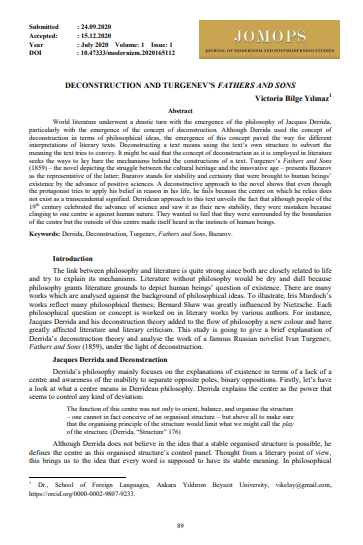DECONSTRUCTION AND TURGENEV’S FATHERS AND SONS
DOI:
https://doi.org/10.47333/modernizm.2020165112Keywords:
Derrida, Deconstruction, Turgenev, Fathers and Sons, BazarovAbstract
Abstract
World literature underwent a drastic turn with the emergence of the philosophy of Jacques Derrida, particularly with the emergence of the concept of deconstruction. Although Derrida used the concept of deconstruction in terms of philosophical ideas, the emergence of this concept paved the way for different interpretations of literary texts. Deconstructing a text means using the text’s own structure to subvert the meaning the text tries to convey. It might be said that the concept of deconstruction as it is employed in literature seeks the ways to lay bare the mechanisms behind the constructions of a text. Turgenev’s Fathers and Sons (1859) – the novel depicting the struggle between the cultural heritage and the innovative age – presents Bazarov as the representative of the latter; Bazarov stands for stability and certainty that were brought to human beings’ existence by the advance of positive sciences. A deconstructive approach to the novel shows that even though the protagonist tries to apply his belief in reason in his life, he fails because the centre on which he relies does not exist as a transcendental signified. Derridean approach to this text unveils the fact that although people of the 19th century celebrated the advance of science and saw it as their new stability, they were mistaken because clinging to one centre is against human nature. They wanted to feel that they were surrounded by the boundaries of the centre but the outside of this centre made itself heard in the instincts of human beings.

Downloads
Published
How to Cite
Issue
Section
License
Articles submitted to the Journal of Modernism and Postmodernism Studies to be evaluated for publication should not be previously published in any publication. In case the articles are accepted for publication, all publication rights belong to the Journal of Modernism and Postmodernism Studies. Author (s) must send the Copyright Transfer Form if their manuscript is accepted for publication in the Journal of Modernism and Postmodernism Studies. The author (s) should sign this form with a wet signature and upload it in the file upload section.
Although the Journal of Modernism and Postmodernism Studies takes the transfer of the publishing rights from the authors, it reserves the following rights:
- Patent rights.
- All unregistered rights other than copyright
- The right to reproduce the work for their own purposes, provided that they do not sell.· The right of the author to use all or part of the work in her/his own book and other academic works, provided that the source is indicated.




